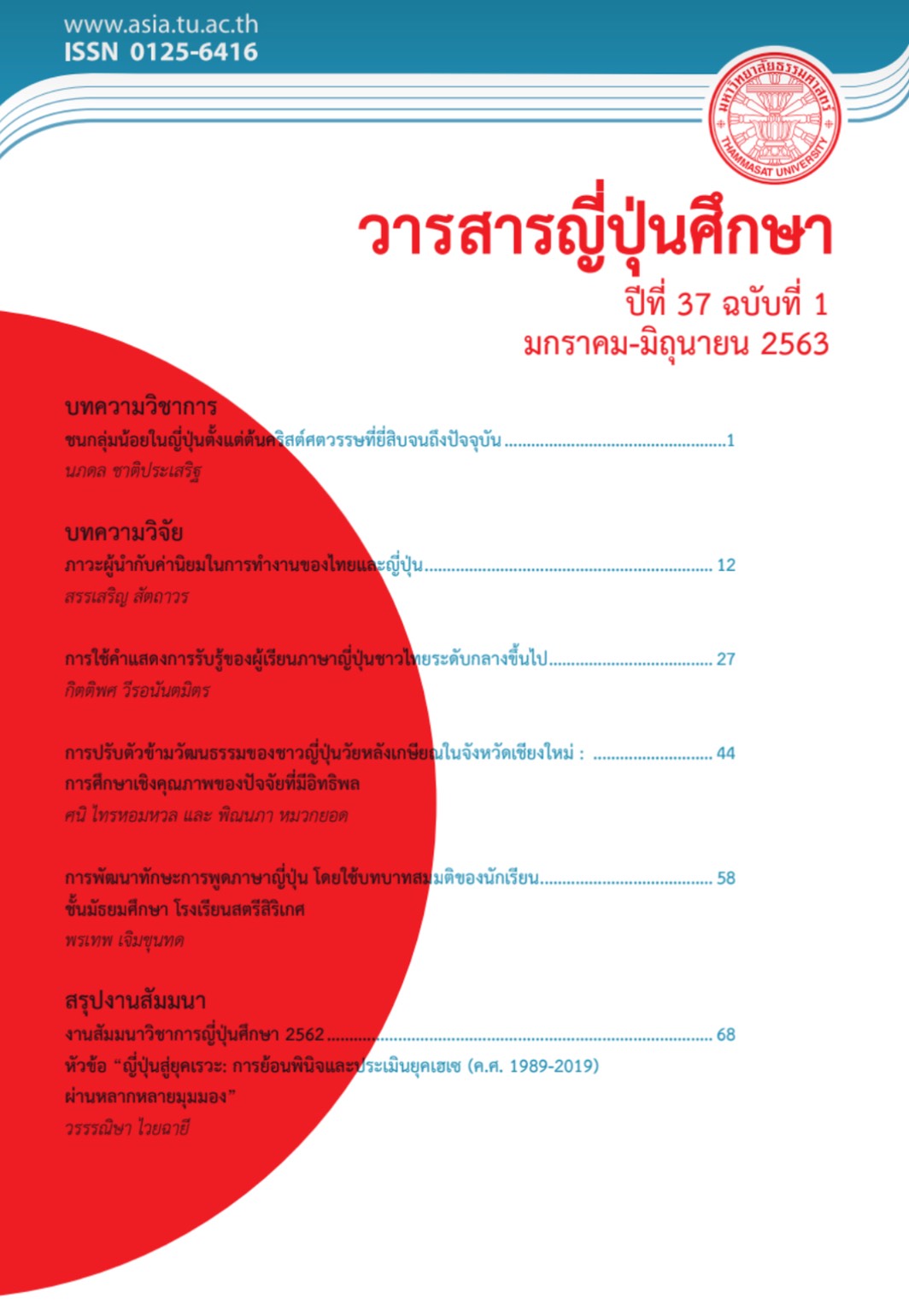The develop Japanese speaking skills by using role play of secondary school students at Satreesiriket School.
Keywords:
บทบาทสมมติAbstract
This research aimed to develop Japanese speaking skills by using role play of secondary school students at Satreesiriket School. The objectives of this research were to study learning activity plan and assessment form for Japanese speaking skills by using role play and to guidelines and suggestions for Japanese speaking skills by using role play. The target group was consisted of 28 Grade 10. The tools used in this research were learning activity plan and assessment form for Japanese speaking skills by using role play to assess based on specified criterion and satisfaction survey form towards speaking skills by using role play lessons. The research findings were as follows:
Regarding the efficiency assessment of the learning activity plan for Japanese speaking skills by using role play, the finding showed that the value of the standardized criteria efficiency (E1 / E2) was 78 / 83
The scores of learning achievement in Japanese speaking skills by using role play of secondary school students at Satreesiriket School showed that students had more progress in learning Japanese speaking skills by using role play. Passed the criteria of 60 percent, 28 people
In addition, the results of satisfaction survey towards speaking skills by using role play lessons of secondary school students at Satreesiriket School revealed that the lessons made students more courageous to speak with foreigners. They were happy to learn and had more improvement. Furthermore, learning Japanese speaking skills by using role play encouraged students to get more preference in Japanese language and could use it practically. The teacher was cheerful and be able to join with students. Also, they were more confident in communication.
Downloads
References
กรรณิกา สร้อยบุดดา. (2553). การใช้กิจกรรมบทบาทสมมติในการพัฒนาทักษะด้านการพูดภาษาอังกฤษของนักเรียนชั้นมัธยมศึกษาปีที่ 4. มหาสารคาม: มหาวิทยาลัยราชภัฏมหาสารคาม..
คมปกรณ์ การพิรมย์. (2556). การพัฒนาทักษะการพูดภาษาอังกฤษโดยใช้กิจกรรมบทบาทสมมติของนักเรียนชั้นมัธยมศึกษาปีที่ 2. ขอนแก่น: มหาวิทยาลัยขอนแก่น. นิติพร เชื้อสุวรรณ. การเปรียบเทียบผลสัมฤทธิ์ทางการเรียนด้านความสามารถในการฟัง-พูดและเจตคติต่อวิชาภาษาอังกฤษของนักเรียนชั้นมัธยมศึกษาปีที่ 2 ที่ได้รับการสอนด้วยวิธีสอนแบบการแสดงบทบาทสมมติกับวิธีสอนแบบปกติ. พระนครศรีอยุธยา: มหาวิทยาลัยราชภัฏพระนครศรีอยุธยา. 2551.บวรจิต พลขันธ์. (2551). การพัฒนาทักษะการพูดภาษาอังกฤษของนักเรียนชั้นมัธยมศึกษาปีที่ 2 โดยใช้
สถานการณ์จำลอง. มหาสารคาม: มหาวิทยาลัยมหาสารคาม. ปาริชาติ เตชะ. (2553). การพัฒนาทักษะการฟังพูดภาษาอังกฤษของนักเรียนชั้นประถมศึกษาปีที่ 5 โดยใช้บทบาทสมมติ. เชียงใหม่: มหาวิทยาลัยเชียงใหม่. พรเทพ เจิมขุนทด. (2557). การจัดการเรียนการสอนภาษาญี่ปุ่นทักษะฟัง-พูด ของนักเรียน ระดับมัธยมศึกษาตอนต้น โดยใช้แอพพลิเคชั่น. ศรีสะเกษ:
มหาวิทยาลัยราชภัฏศรีสะเกษ. พัฒนา สุมาลี. (2550). การพัฒนาความสามารถด้านการพูดในโอกาสต่าง ๆ โดยใช้การสอนแบบบทบาทสมมุติ วิชาทักษะภาษาไทยเพื่ออาชีพ ของนักศึกษาระดับประกาศนียบัตรวิชาชีพชั้นสูง. มหาสารคาม: มหาวิทยาลัยมหาสารคาม. สุมิตรา อังวัฒนกุล. (2537). วิธีสอนภาษาอังกฤษเป็นภาษาต่างประเทศ. กรุงเทพฯ: โรงพิมพ์แห่งจุฬาลงกรณ์มหาวิทยาลัย. สุมิตรา อังวัฒนกุล. (2539). วิธีการสอนภาษาอังกฤษ. พิมพ์ครั้งที่ 3. กรุงเทพฯ: โรงพิมพ์แห่งจุฬาลงกรณ์ มหาวิทยาลัย. สุวัฒน์ชัย ถุนาพรรณ์. (2555).การพัฒนาทักษะ
การพูดภาษาอังกฤษเพื่อการสื่อสารโดยใช้กิจกรรมบทบาท สมมติ ของนักเรียนชั้นมัธยมศึกษาปีที่ 1 โรงเรียนท่าขอนยางพิทยาคม องค์การบริหารส่วนจังหวัดมหาสารคาม. มหาสารคาม: มหาวิทยาลัยราชภัฏมหาสารคาม.




